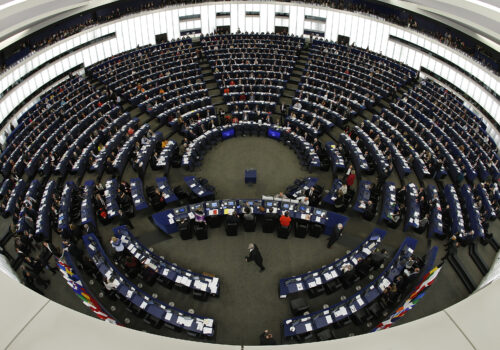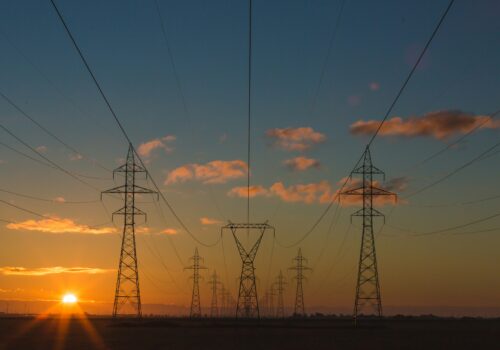What will North Macedonia’s upcoming elections mean for its EU accession prospects?
Seven years ago, North Macedonia’s Social Democrats came to power on the promise of European Union (EU) integration and the fight against corruption. With too little progress made on either, disillusioned voters today look set to bring back the unreformed conservative VMRO-DPMNE, whose 2006-2016 time in power was marked by undemocratic trends. Center-right candidate Gordana Siljanovska-Davkova, backed by VMRO-DPMNE, trounced incumbent president Stevo Pendarovski, supported by the ruling center-left SDSM, and five other candidates in the first round of North Macedonia’s presidential election on April 24. The result could be a precursor of what’s to come as the country heads for parliamentary elections and a runoff presidential vote on May 8.
Wrapped up in this electoral contest is the issue of a constitutional amendment. In 2020, Bulgaria vetoed North Macedonia’s EU accession. Sofia has since demanded the inclusion of language in North Macedonia’s constitution recognizing ethnic Bulgarians as one of the country’s founding peoples as a prerequisite to restarting EU accession negotiations. The proposed amendment is but one in a series of disputes over identity and history that have plagued relations between the two countries and halted North Macedonia’s progress toward EU membership. Polling has found that over two-thirds of North Macedonia’s citizens are against the constitutional changes. The ruling SDSM and the parties from the Albanian bloc (DUI and VLEN) are in favor of the amendments, whereas the opposition VMRO-DPMNE, ZNAM, and Levica are opposed.
First impressions from the first round
To get a better sense of what might happen on May 8, it is worth looking at the April 24 results. According to North Macedonia’s State Election Commission, Siljanovska-Davkova received 40 percent of the vote, more than double that of Pendarovski, who received just under 20 percent. Siljanovska-Davkova outperformed polls, and her victory will be wind in the back of VMRO-DPMNE heading into the general election next week. In contrast, Pendarovski’s performance is the worst result by a Social Democrat candidate since the country’s independence in 1991, indicating voter dissatisfaction with the SDSM-DUI coalition government of the past seven years.
Aside from VMRO-DPMNE’s better-than-expected performance and SDSM’s lackluster result, there were several surprises from the first-round vote.
Some analysts thought before the election that voter apathy, a lack of interest in politics, and disillusionment with the current government and the unreformed opposition would result in low voter turnout. However, turnout stood at nearly 50 percent, which was higher than the 42 percent first-round turnout in 2019. With seven candidates running, the high number of options likely helped drive voters to the polls. Since the runoff vote is paired with parliamentary elections, turnout is expected to remain stable. However, a possible boycott by ethnic Albanian voters could threaten the 40 percent presidential turnout threshold.
Another surprise was the strong showing of Kumanovo Mayor Maksim Dimitrievski, backed by his newly formed ZNAM movement. Dimitrievski overperformed the polls, raking in more than 83,000 votes (9.26 percent of the vote), putting him in fourth place. This positioned the ZNAM movement as an influential third option ahead of the parliamentary election. A former Social Democrat, Dimitrievski peeled off the more conservative wing of SDSM, with many former party members now running on his ZNAM ticket.
Amid speculation that the united Albanian opposition, VLEN, might finally outperform the ruling Albanian Democratic Union for Integration (DUI), the result did not live up to expectations. Despite a bitter battle, DUI’s candidate, Bujar Osmani, defeated VLEN’s Arben Taravari by some 37,000 votes. While VLEN weaved together the main opposition voices in the Albanian political bloc, the DUI still had the state apparatus in its corner and brought into its fold Menduh Thaçi’s DPA, Ziadin Sela’s wing of Alliance for Albanians, as well as several parties from the Roma, Turkish, and Bosniak communities, giving them enough to eke out a win.
Finally, the left-wing Levica party fell flat, with Biljana Vankovska Cvetkovska getting just a little more than 41,000 votes, or about 4.5 percent. But this result could be evidence that the party has stabilized its base, as it received around 37,000 votes in the 2020 parliamentary election and around 50,000 votes in the 2021 local election. Vankovska Cvetkovska’s poor performance could harm the party in the general elections, though its parliamentary candidates could have stronger showings since some other party members enjoy higher popularity.
VMRO-DPMNE’s Siljanovska-Davkova remains favored to defeat SDSM’s Pendarovski in the runoff, but all eyes are on the losing candidates and which camp they will throw their weight behind. So far, mum’s the word.
The coalition-building process
There are seventeen parties or coalitions running in the parliamentary elections on May 8, but only VMRO-DPMNE, SDSM, DUI, VLEN, ZNAM, and Levica are projected to pick up seats. The most likely coalition to form a government would be among VMRO-DPMNE, VLEN, and ZNAM. Based on recent polls, they would likely have a comfortable seventy-five-seat majority in the 120-seat parliament. VMRO-DPMNE has shown openness to working with both VLEN and ZNAM for some time now. However, the multiparty composition of VLEN will complicate the coalition-building process.
Furthermore, VLEN’s stance in favor of the constitutional amendments and VMRO-DPMNE and ZNAM’s opposition is another challenge. VLEN has made other demands for policies that VMRO-DPMNE opposes, and these demands could become a factor. First, VLEN wants the president to be elected by parliament rather than via direct elections. Second, it wants to reformulate the Ohrid Agreement, signed in 2001, so that Albanian is explicitly an official language of North Macedonia, replacing the current policy in which “any language spoken by at least 20 percent of the population is also an official language.”
Whatever coalition ultimately forms, however, it is unlikely that there will be enough votes in parliament to pass the constitutional amendments, which would require a two-thirds majority. The parties in favor of the amendments (SDSM, DUI, and VLEN) are projected to win as few as fifty-three seats and would need to convince almost thirty other members of parliament to change their position to pass the amendments. This would be a daunting task given that the parties in favor of the amendments now have more than sixty members in parliament and have been unable to complete the task.
As the constitutional amendments remain front and center in the election campaign, political parties have ramped up nationalist rhetoric. With VMRO-DPMNE poised to rise to power, the country’s EU accession is in flux. It is unlikely that the next government will succeed in either renegotiating the EU’s accession framework or stalling the constitutional changes until the country is on the cusp of joining the EU.
Recent history has shown that when progress toward accession halts due to international disputes, North Macedonia can take an undemocratic turn and lose years in the EU waiting room. As the election approaches, the everyday concerns of citizens—such as healthcare, the economy, youth emigration, the environment, and the fight against corruption—are being pushed to the background. Regardless of the election outcome, however, political polarization will persist, and North Macedonia’s EU integration will likely remain at a standstill for the foreseeable future.
Aleksej Demjanski is a political analyst and editor of the “Macedonian Matters” weekly newsletter.
Further reading
Fri, Jun 30, 2023
The next European Union member is…
New Atlanticist By
Ten years after Croatia joined the bloc—the last country to do so—Atlantic Council experts look at eleven countries that might join next.
Mon, Apr 15, 2024
Your primer on the European Parliament elections and how they will shape the EU
Eye on Europe's elections By
As Europe heads to the polls to elect the 10th European Parliament this June, the Europe Center is breaking down the key people and issues to know.
Mon, Feb 26, 2024
Western Balkans must pursue more competitive energy sectors
Issue Brief By Matthew Bryza
The EU needs to take steps to support more competition and efficiency in the energy sectors of Bulgaria and the Western Balkans to advance the energy transition and promote energy independence from Russia.
Image: Commercial Billboards of Presidental candidates Stevo Pendarovski supported by Social democrats R and Gordana Siljanovska Davkova candidate of VMRO DPMNE L in Skopje , North Macedonia April 9 2024. IMAGO/PETR STOJANOVSKI


